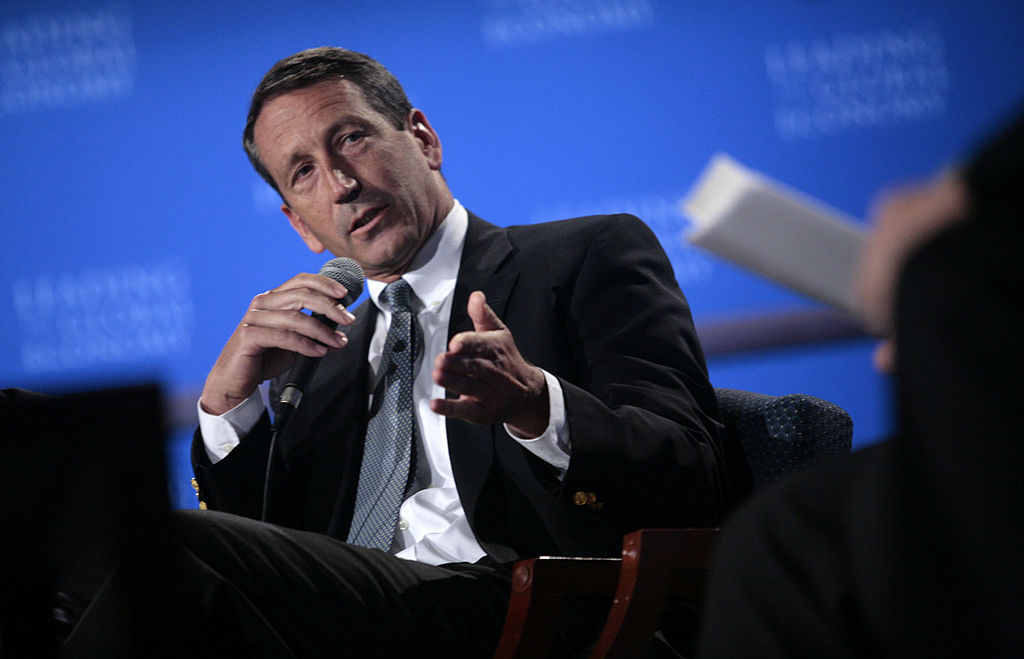
Former South Carolina Gov. Mark Sanford, who is weighing a primary bid against President Donald Trump, says he’s in the “final throes” of deciding whether to launch a 2020 campaign.
Sanford said he hopes to have his mind made up around Labor Day. This week, he’s spending time in Iowa deliberating the potential run. If he chooses to pursue it, he would join former Rep. Joe Walsh — a one-term Tea Party lawmaker who has a history of making racist comments — and former Massachusetts Gov. Bill Weld — who ran for Vice President in 2016 on the Libertarian ticket — in the field of Republicans running against a sitting President of their own party.
“It’s daunting, and it’s intimidating, and it’s overwhelming in human terms,” Sanford told TIME in a phone interview Tuesday morning. “Nobody wants to be a human piñata … [for] the President who seems to come up with a nickname for anyone. But at the same time I feel called to do it.”
As if on cue, Trump tweeted about Sanford later in the day on Tuesday, making sure to mention the “Appalachian Trail” scandal involving Sanford’s extramarital affair with a woman from Argentina a decade ago. Prior to the affair, there was presidential chatter around Sanford.
“Can you believe it? I’m at 94% approval in the Republican Party, and have Three Stooges running against me. One is ‘Mr. Appalachian Trail’ who was actually in Argentina for bad reasons,” Trump said in the first of a couple of tweets.
This is not Sanford’s first back-and-forth with the President. Last year, when Sanford was still serving in the House of Representatives (in his old seat, his before he served as governor), Trump endorsed Sanford’s challenger hours before polls closed. Sanford, who had been critical of Trump, went on to lose his primary. It was the first election he had ever lost. In a closed-door meeting with the House Republican conference after Sanford lost, Trump took a dig at Sanford, which did not go over well with members of the conference.
In his interview with TIME, Sanford expressed remorse about the current state of the Republican party.
“There are a lot of us who have worked for years in the Republican party and feel lost not only by the way in which traditional tenants of the party have been seemingly cast aside, whether that’s on debt spending, whether that’s on free trade, whether that’s on civility and tone,” Sanford says.
“I mean, does it mean that you have to hurl insults and frankly be mean to be a Republican? Is that the brand? I think there are some legitimate questions given the tone and tenor and focus of the administration that a lot of Republicans would have about, where are we going with this? What’s it mean to be a Republican these days? Is this it?”
He also lamented the way some Republicans have gone to bat for Trump. “A lot of people are contorting themselves to fit around the Trump orbit, you know, where he’s the center of it, and the sun, moon, and stars are aligned and circle him. But that’s not what I believe.”
Specifically, he referenced South Carolina Sen. Lindsey Graham — “One day he’s a big Trump critic and now he’s suggesting that Trump is a genius” — and acting White House Chief of Staff Mick Mulvaney — “It wasn’t that long ago he was saying the deficit is a systemic threat to our civilization” — as examples.
Asked about the House Freedom Caucus, a conservative coalition of which Sanford was once a member that today boasts some of Trump’s biggest allies in Congress, Sanford now says that although “they’re great guys,” the group has turned into “something of a lapdog defensive unit for the President.”
And asked if he would consider following the path of Rep. Justin Amash, a former colleague of his, and leave the Republican party, Sanford said no (adding that he sees “complete legitimacy” to Amash’s decision), and instead said he’d rather attempt to change the party from within.
“Why don’t we have a conversation about where we’re going, and does this movie end well if we stay on this current track?” Sanford said. “That’s where I’ve chosen to focus my energy, whether that’s a run or in coming up with an advocacy group to talk about debt deficits.”
More Must-Reads from TIME
- Donald Trump Is TIME's 2024 Person of the Year
- Why We Chose Trump as Person of the Year
- Is Intermittent Fasting Good or Bad for You?
- The 100 Must-Read Books of 2024
- The 20 Best Christmas TV Episodes
- Column: If Optimism Feels Ridiculous Now, Try Hope
- The Future of Climate Action Is Trade Policy
- Merle Bombardieri Is Helping People Make the Baby Decision
Write to Lissandra Villa at lissandra.villa@time.com
